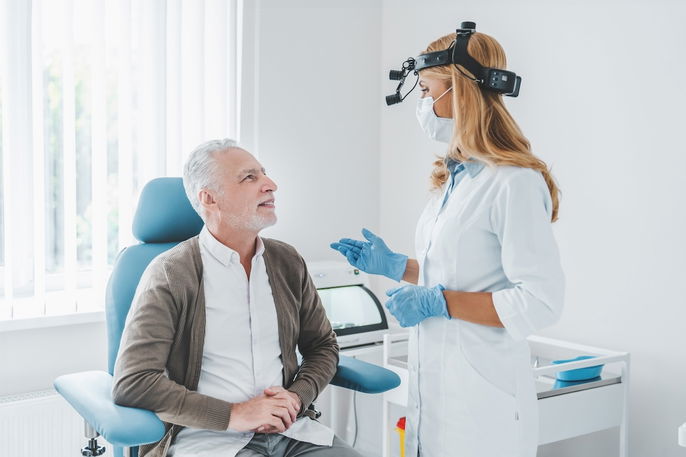Bacterial sinusitis is an inflammation of the nasal sinuses caused by bacteria that can lead to symptoms like bad breath, facial pressure, headaches, and fever.
Bacterial sinusitis generally develops following a cold, the flu, or an allergy attack, which make the mucose membranes more sensitive to bacteria that invade and multiply in the sinuses.
Treatment of bacterial sinusitis is managed by a primary care provider or otolaryngologist, who can prescribe the use of antibiotics and decongestants in addition to the use of nasal irrigation and other home remedies.

Common symptoms
The main symptoms of bacterial sinusitis are:
- Headache around the eyes;
- Cough that is worse at night;
- Runny or stuffy nose;
- Green or yellow discharge from the nose;
- Fever, which is usually high (above 39ºC or 102.2ºF);
- Sensation of heaviness or pressure in the face, primarily when bending the head down.
Other symptoms may include facial pain, toothache, bad breath, ear pressure, or a bad smell in the nose.
Bacterial sinusitis can also cause loss of smell, sore throat, excessive tiredness, and malaise.
The symptoms of bacterial sinusitis last for more than 10 days, and may last for up to 4 weeks, and are similar to symptoms of viral, allergic, and fungal sinusitis.
Also recommended: Chronic Sinusitis: Symptoms, Diagnosis, Causes & Treatment tuasaude.com/en/chronic-sinusitisSymptom checker
Use the symptom checker below to find out if your symptoms might be caused by sinusitis (check all that apply):
This symptoms checker is only a tool and should not be used to diagnose any condition or take the place of a consult with your primary care provider or otolaryngologist.
Confirming a diagnosis
Bacterial sinusitis is diagnosed by a primary care provider or otolaryngologist based on an evaluation of symptoms, medical history, and a physical exam.
During the physical exam, the doctor or advanced practice provider will palpate your nasal sinuses to evaluate for pain and sensitivity in that region, in addition to examining your nasal passages.
Diagnosis of bacterial sinusitis does not usually require any additional tests.
In some cases, however, a doctor may perform an endoscopy to collect a sample of nasal secretions to evaluate in the lab in order to identify the bacteria responsible for the sinusitis.
Possible causes
Bacterial sinusitis is an inflammation of the nasal sinuses caused by bacteria, such as:
- Streptococcus pneumoniae;
- Haemophilus influenzae;
- Moraxella catarrhalis.
Bacterial sinusitis generally develops following colds, the flu, or an allergy attack, which make the nasal mucosa more vulnerable to invasion by bacteria that multiply in the sinuses.
Other risk factors for developing bacterial sinusitis include tobacco exposure, smoking, a deviated septum, cold temperatures, humidity, anxiety, and stress, which can also increase the sensitivity of the nasal mucosa to bacteria.
Is it contagious?
Sinusitis itself is not contagious, however the viruses and bacteria that cause it can be.
Treatment options
Treatment of bacterial sinusitis is managed by a primary care provider or otolaryngologist with the goal of eliminating the bacteria and relieving symptoms.
The main treatments indicated for bacterial sinusitis include:
1. Antibiotics
Antibiotics for a sinus infection include amoxicillin, ceftriaxone, and doxycycline, which may be prescribed to help fight bacteria.
Dosing of these antibiotics will depend on age, symptoms, and overall health status, but are typically prescribed for 7 days in adults and 10 days in children.
2. Analgesics and decongestants
In addition to antibiotics, a doctor may also prescribe the use of other sinusitis medications like nasal decongestants or analgesics to help alleviate facial pain, nasal congestion, and fever.
Anti-inflammatories or corticosteroids may also be indicated.
3. Nebulizer treatments
Nebulizer treatments for bacterial sinusitis may be indicated to help moisten the airways, thin out secretions, and unblock the respiratory passages.
This type of treatment involves inhaling a vapor that may contain normal saline (salt water) and/or medications prescribed by your doctor.
Nebulizer treatments are done using an electronic nebulizer machine at home or in the hospital for 15 to 20 minutes, 2 to 3 times per day.
4. Nasal irrigation
Nasal irrigation for bacterial sinusitis involves rinsing your sinuses with a saline solution, which can be done using a syringe or other device.
Nasal irrigation can be used to treat all types of sinusitis (including bacterial sinusitis) and can complement the use of antibiotics and other medications.
Nasal irrigation works by hydrating the sinuses and thinning out secretions, helping alleviate discomfort and eliminate secretions.
Use only distilled or sterile water, filtered water, or boiled and cooled tap water for nasal irrigation and be sure to clean your devices thoroughly after each use.
Read about other home remedies for sinus infections.
5. Fluids
Drinking lots of fluids, like water, coconut water, and natural juices without added sugar, hydrates the body, including the lining of the sinuses, helping to thin out and eliminate secretions.
Drinking teas with anti-inflammatory, expectorant, and analgesic properties (such as ginger tea with garlic, thyme tea with honey, and equinacea tea) can also help.
6. A well-balanced diet
Maintaining a well-balanced diet that includes foods high in fiber, omega-3s, vitamin C, and antioxidants can help strengthen the immune system to fight bacteria and speed up recovery from sinusitis.
Be sure to include foods like red fruits, citrus fruits, dark green leafy vegetables, herbs, and natural seasonings.
Check out other immune system boosters.
7. Vaporizers
Using a vaporizer with essential oils like thyme, eucalyptus, or peppermint can also help thin out secretions and unblock the nose.
This type of treatment can be used to complement the use of other medications prescribed by your doctor.
8. A good night's sleep
Getting at least 7 to 9 hours of sleep a night is important for strengthening the immune system and helping to combat the bacteria that cause sinusitis.






























